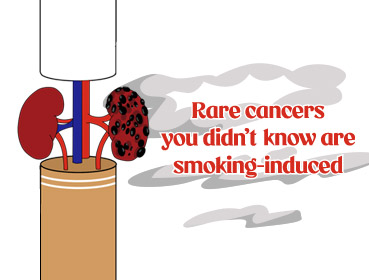Why lung cancer is rising among non-smokers
3 significant risk factors of lung cancer for non-smokers
Partner content: Content has been reproduced with the permission of, and is wholly owned by Parkway Cancer Centre. Great Eastern does not own or claim to own any rights to the content shared.
Lung cancer has always been inseparable from one of its biggest risk factors–smoking. However, recent studies have shown that the incidence of lung cancer among non-smokers is rising. In this article, we will be discussing some reasons why lung cancer is becoming more prevalent among non-smokers.
In Singapore, lung cancer is one of the most frequent incident cancers, given that it is the third-most common cancer in both men and women1.
Lung cancer has always been predominantly associated with cigarette smoking. As such, the Health Promotion Board has been adopting a strong multi-pronged approach in an attempt to reduce smoking prevalence in Singapore. This approach includes public education, provision of smoking cessation services, legislation controlling tobacco advertising, sales of cigarettes to minors, and taxation.
However, a study conducted in Singapore has shown that lung cancer has been steadily increasing among never-smokers–more commonly known as non-smokers. In the study, the proportion of never-smokers increased from 31% in 1999-2002 to 48% in 2008-20112. This means that apart from smoking, there remain other significant risk factors of lung cancer.
Here, we discuss some reasons why lung cancer is rising among non-smokers:
1. Environmental exposure to air pollution / Second-hand tobacco smoke (ETS)
- Recent work3 has shown that tiny pollutant particles in the air (air pollution PM2.5) can increase the risk of lung cancer in non-smokers by causing inflammation in the lungs. This in turn “wakes up” usually inactive cells carrying cancer-causing mutations, which can lead to cancer. This appears at this point to be different from how smoking may result in cancer by directly mutating DNA.
- Indoor air pollutants such as indoor smoke from burning solid fuels may also contribute to development of lung cancers in non-smokers. According to the World Health Organisation (WHO), burning solid fuels, such as wood or coal, is likely to be the largest source of indoor air pollution globally4. When used in simple cooking stoves, these fuels emit substantial amounts of pollutants, including carbon monoxide, nitrogen and sulphur oxides, and benzene.
Studies have shown consistent associations between the use of solid fuels and a number of diseases, including acute respiratory infections, chronic obstructive pulmonary disease, and lung cancer5.
- Environmental tobacco smoke (ETS), also known as secondhand smoke, contains all the same toxic components as mainstream tobacco smoke, although in different relative amounts. Studies have shown that ETS is associated with various diseases, including lower respiratory infections, asthma, heart disease, nasal-sinus cancer, and lung cancer6.
2. Exposure to other environmental toxins
According to WHO, it is estimated that 3-14% of lung cancers can be attributed to radon, depending on the average radon concentration in the country concerned and the calculation methods7.
Radon is a naturally occurring radioactive noble gas present throughout the Earth's crust. The gas is formed during the Earth's radioactive decay process. As radon is released during the decay process, it can readily diffuse through rocks and soil into any air space and accumulate in enclosed spaces, including homes and buildings8.
The concentration of radon greatly varies depending on the construction of buildings, ventilation habits, seasonal changes and daily weather variations. The biggest driving force of radon entry into enclosed spaces is the difference in air pressure between the soil and the occupied space, which results in the radon gas permeating into such spaces.
Other commonly associated toxins with the development of lung cancers may include asbestos, chromium and arsenic.
3. Genetic factors
There have been studies that suggest that lung cancer may be more common in those with a positive family history of cancer, suggesting that genetic factors may play a part. Although there are some genes more commonly found in families with lung cancers, this remains an area of research at this point.
Reducing the risks
Smoking is the leading cause of lung cancer; it is responsible for a significant number of lung cancers, and everyone should do their part to reduce exposure to tobacco smoke. However, there are other risk factors at play, including exposure to environmental air pollution and toxins. With collective effort, we hope to cut the emission of pollutants and correspondingly, the incidence of lung cancers.
Stay protected with our health insurance plans.
1 Singapore Cancer Registry Annual Report 2020.
2 Toh CK, Ong WS, Lim WT, et al. A Decade of Never-smokers Among Lung Cancer Patients-Increasing Trend and Improved Survival. 2018.
3 Hill, W., Lim, E.L., Weeden, C.E. et al. Lung adenocarcinoma promotion by air pollutants. 2023.
4 The World Health Report. WHO, 2002.
5 Smith KR. Indoor air pollution in developing countries: recommendations for research. 2002.
6 Respiratory Health Effects of Passive Smoking: Lung Cancer and Other Disorders, 1992.
7 Handbook on Indoor Radon: A Public Health Perspective. WHO, 2009.
8 Hopke PK, Jensen B, Li CS, et al. Assessment of the exposure to and dose from radon decay products in normally occupied homes. 1995.
Let us match you with a qualified financial representative
Our financial representative will answer any questions you may have about our products and planning.









